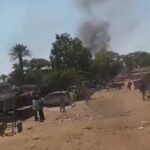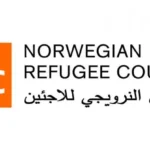Darfur Follow-ups: Elgeneina
Hundreds of protesters demonstrated in the city of El Geneina, the capital of West Darfur State, yesterday, Monday, in opposition to the decision of the Federal Minister of Government to relieve the governor of West Darfur State, Tajani Al-Tahir Karshom, from his position.
In a statement, the Gathering of Initiatives of the People of West Dar State stressed their rejection of the decision of the Ministry of Federal Government to appoint a Secretary of Government and dismiss the Deputy Governor of the state, at a time when they delegated Mr(Al-Tijani Al-Tahir Karshom) as governor-designate of West Darfur State, given his efforts to stabilize the state without any central support or Institutional aid, and a continuation of the renaissance of the stricken state.
The statement drew the attention of the Federal Minister of Government to the fact that such decisions are made with the advice of the people of the state, and warned the Federal Ministry of Finance not to tamper with the state’s financial allocations and employee salaries and transfer them to the state of Chad, to empty the state of employees, and to continue closing institutions, after the state’s security conditions have stabilized.
The statement called on the judicial and police agencies to return to service, and to open prosecution offices in order to contribute to the stability of the state, and called on those who were forced to leave their homes as a result of acts of violence, to return to their homes and jobs, stressing that the state of Chad was the best support for the return of refugees after the state stabilized, and the borders were opened for relief organizations to cross. It was also a support and refuge for the people of the state fleeing the war of difference, as the statement called it, praising the efforts of the Rapid Support Forces in providing security and securing the agricultural season, and he addressed them saying: (You have become the main force in West Darfur state, and the greatest burden of providing security falls on you).
The statement called on the Sovereignty Council to comply with the voice of the citizens of West Darfur State, which unanimously agreed to choose a strong and honest man, referring to Mr Tijani Al-Taher Karshom, warning that any attempt to impose an opinion or decision may return the state to its previous era, which it has surpassed with all bitterness and loss. And pain.
The citizens of West Darfur handed over a protest note to the People of El Geneina Initiative, which includes the Syndicate of Doctors, Imams, Preachers, and the Native Administration, in order to hand it over to the Sovereignty Council.
Prince (Azhari Ahmed Al-Sanussi), representative of the Native Administration, said that these masses came for Karshom not out of love for him, but rather for his justice in governance. He called on the federal government to review the exemption decision, stressing his support and support for Karshom, “because he is a man of peace,” and said: “There is no alternative to Karshom except Karshom.” He addressed the center, saying: (Is the person you have appointed to serve as governor able to come to El Geneina?) He added: (We, as a civil administration, with our bases, support Karshom, and if the center is keen on this mandate, it must keep Karshom.)
For his part, the official spokesman for the Arab tribes, Prince Masar Abdel Rahman, described the crowds that took to the streets as participating in a major event and a momentous matter. He added: “West Darfur went through a tragedy and harsh conditions,” expressing his hope that the displaced and refugees, who The war forced them to leave their homes.
Masar pointed out that, after the killing of the governor (Khamis Abkar), Karshom refused to exercise his duties, but the citizens of the state, in their various sectors, forced Karshom to continue his duties in governing the state.
He added: (There was no state with functioning institutions, but he was patient, focused, and worked diligently, and gave the state a lot until it was brought to safety), and he continued: (We learned that the Ministry of Federal Government appointed a person unknown to the citizens of the state, and all these wars and destruction to which he was exposed Sudan was due to arrogance in governance and failure to recognize the rights of citizens.
Masar drew attention to the fact that West Darfur emerged from a brutal tribal war, and another war between the army and the Rapid Support, and said that decision-makers must look at its situation and its tragedy, indicating that Karshom was able to restore electricity, water and communications services, open markets, and save lives. and citizens’ property. While the rulers of the center contributed to the wars that West Darfur experienced and sowed strife in it.
He added: (The people of West Darfur are afflicted, and are emerging from war and scourges. Therefore, they cannot confront another war, and incitement or strife is of no use), considering the dismissal of Karshom, and the appointment of a government secretary with the duties of a governor, behind which there are intentions for sabotage and fragmentation.
All social components and leaders of the civil administration, including the leaders of both sides of the civil war, participated in the processions organized by the West Darfur State Initiatives Gathering.
Karshom assumed the duties of the governor of West Darfur after the killing of the former governor, Khamis Abdullah Abkar, on the fourteenth of last June. Before that, he held the position of deputy governor for the share of the Sudan Liberation Movements Group, which is headed by Al-Taher Hajar, within Juba’s peace agreement par.
The April 15 war between the army and the Rapid Support Forces led to the deepening of the tribal division among the residents of West Darfur State, which has not recovered from the effects of previous tribal conflicts. The division over the position of government representatives extended to include the late governor Khamis and his deputy Karshom, as the two men belonged to two discordant ethnic groups despite their affiliation to the armed movements. Since the first day of the war, the Karshom ethnic group has accused the late governor Khamis of being loyal to the army, while the Karshom ethnicity has accused the Khamis ethnic group of being loyal to the Rapid Support Forces.








